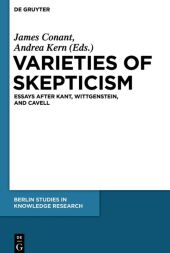 Neuerscheinungen 2016Stand: 2020-02-01 |
Schnellsuche
ISBN/Stichwort/Autor
|
Herderstraße 10
10625 Berlin
Tel.: 030 315 714 16
Fax 030 315 714 14
info@buchspektrum.de |

James Conant, Andrea Kern
(Beteiligte)
Varieties of Skepticism
Essays after Kant, Wittgenstein, and Cavell
Herausgegeben von Conant, James; Kern, Andrea
2016. VI, 457 S. 230 mm
Verlag/Jahr: DE GRUYTER 2016
ISBN: 3-11-048179-0 (3110481790)
Neue ISBN: 978-3-11-048179-2 (9783110481792)
Preis und Lieferzeit: Bitte klicken
The Berlin Studies in Knowledge Research (BSKR) series aims to foster systematic research into the variety of forms of knowledge as well as to uncover aspects of their underlying unity. The conception of the discipline of epistemology it seeks to promote is a generous-one which encompasses a study of the full variety of forms, practices and dynamics of knowledge, as well as their mutually interacting points of contact and their respective mechanisms of interpenetration. It seeks thereby to bring about a reorientation of the discipline of epistemology, undoing artificial restrictions in its scope and achieving a greater appreciation of the heterogeneity of different forms of knowledge. The series BSKR is associated with the Innovationszentrum Wissensforschung (IZW) / Center for Knowledge Researchat the TU Berlin, Germany.
This volume brings out the varieties of forms of philosophical skepticism that have continued to preoccupy philosophers for the past of couple of centuries, as well as the specific varieties of philosophical response that these have engendered - above all, in the work of those who have sought to take their cue from Kant, Wittgenstein, or Cavell - and to illuminate how these philosophical approaches are related to and bear upon one another. The philosophers brought together in this volume are united by the thought that a proper appreciation of the depth of the skeptical challenge must reveal it to be deeply disquieting, in the sense that skepticism threatens not just some set of theoretical commitments, but also-and fundamentally-our very sense of self, world, and other. Second, that skepticism is the proper starting point for any serious attempt to make sense of what philosophy is, and to gauge the prospects of philosophical progress.
James Conant, University of Chicago, USA. Andrea Kern, University of Leipzig, Germany.


